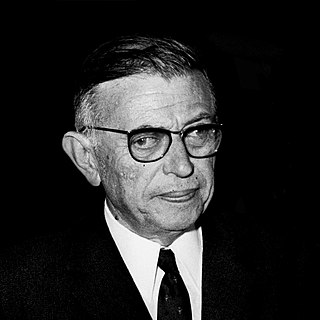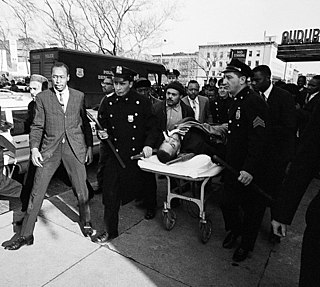
Jean-Paul Charles Aymard Sartre was a French philosopher, playwright, novelist, screenwriter, political activist, biographer, and literary critic, considered a leading figure in 20th-century French philosophy and Marxism. Sartre was one of the key figures in the philosophy of existentialism. His work has influenced sociology, critical theory, post-colonial theory, and literary studies, and continues to do so. He was awarded the 1964 Nobel Prize in Literature despite attempting to refuse it, saying that he always declined official honors and that "a writer should not allow himself to be turned into an institution."

Malcolm X was an American Muslim minister and human rights activist who was a prominent figure during the civil rights movement. A spokesman for the Nation of Islam (NOI) until 1964, he was a vocal advocate for Black empowerment and the promotion of Islam within the Black community. A posthumous autobiography, on which he collaborated with Alex Haley, was published in 1965.

Frantz Omar Fanon was a Francophone Afro-Caribbean psychiatrist, political philosopher, and Marxist from the French colony of Martinique. His works have become influential in the fields of post-colonial studies, critical theory, and Marxism. As well as being an intellectual, Fanon was a political radical, Pan-Africanist, and Marxist humanist concerned with the psychopathology of colonization and the human, social, and cultural consequences of decolonization.

The Wretched of the Earth is a 1961 book by the philosopher Frantz Fanon, in which the author provides a psychoanalysis of the dehumanizing effects of colonization upon the individual and the nation, and discusses the broader social, cultural, and political implications of establishing a social movement for the decolonisation of a person and of a people. The French-language title derives from the opening lyrics of "The Internationale" anthem.
A colonial mentality is the internalized attitude of ethnic or cultural inferiority felt by people as a result of colonization, i.e. them being colonized by another group. It corresponds with the belief that the cultural values of the colonizer are inherently superior to one's own. The term has been used by postcolonial scholars to discuss the transgenerational effects of colonialism present in former colonies following decolonization. It is commonly used as an operational concept for framing ideological domination in historical colonial experiences. In psychology colonial mentality has been used to explain instances of collective depression, anxiety, and other widespread mental health issues in populations that have experienced colonization.
Négritude is a framework of critique and literary theory, mainly developed by francophone intellectuals, writers, and politicians in the African diaspora during the 1930s, aimed at raising and cultivating "Black consciousness" across Africa and its diaspora. Négritude gathers writers such as sisters Paulette and Jeanne Nardal, Martinican poet Aimé Césaire, Abdoulaye Sadji, Léopold Sédar Senghor, and Léon Damas of French Guiana. Négritude intellectuals disavowed colonialism, racism and Eurocentrism. They promoted African culture within a framework of persistent Franco-African ties. The intellectuals employed Marxist political philosophy, in the Black radical tradition. The writers drew heavily on a surrealist literary style, and some say they were also influenced somewhat by the Surrealist stylistics, and in their work often explored the experience of diasporic being, asserting one's self and identity, and ideas of home, home-going and belonging.

"The Ballot or the Bullet" is the title of a public speech by human rights activist Malcolm X. In the speech, which was delivered on two occasions the first being April 3, 1964, at the Cory Methodist Church in Cleveland, Ohio, and the second being on April 12, 1964, at the King Solomon Baptist Church, in Detroit, Michigan. Malcolm X advised African Americans to judiciously exercise their right to vote, but he cautioned that if the government continued to prevent African Americans from attaining full equality, it might be necessary for them to take up arms. It was ranked 7th in the top 100 American speeches of the 20th century by 137 leading scholars of American public address.

The Organization of Afro-American Unity (OAAU) was a Pan-Africanist organization founded by Malcolm X in 1964. The OAAU was modeled on the Organization of African Unity, which had impressed Malcolm X during his visit to Africa in April and May 1964. The purpose of the OAAU was to fight for the human rights of African Americans and promote cooperation among Africans and people of African descent in the Americas.

Mumbo jumbo, or mumbo-jumbo, is confusing or meaningless language. The phrase is often used to express humorous criticism of middle-management, and specialty jargon, such as legalese, that non-specialists have difficulty in understanding. For example, "I don't understand all that legal mumbo jumbo in the fine print."
Double consciousness is the dual self-perception experienced by subordinated or colonized groups in an oppressive society. The term and the idea were first published in W. E. B. Du Bois's autoethnographic work, The Souls of Black Folk in 1903, in which he described the African American experience of double consciousness, including his own.

Negrophobia is characterized by a fear, hatred, discrimination or extreme aversion to Black people and Cape Coloureds or Coloureds, and Black culture worldwide. Caused amongst other factors by racism and traumatic events and circumstances, symptoms of this phobia include but are not limited to the attribution of negative characteristics to Black and Coloured people, the fear or the strong dislike of Black and Coloured men and the objectification of Black and Coloured women.

Black Skin, White Masks is a 1952 book by philosopher-psychiatrist Frantz Fanon. The book is written in the style of autoethnography, with Fanon sharing his own experiences while presenting a historical critique of the effects of racism and dehumanization, inherent in situations of colonial domination, on the human psyche.

Présence Africaine is a pan-African quarterly cultural, political, and literary magazine, published in Paris, France, and founded by Alioune Diop in 1947. In 1949, Présence Africaine expanded to include a publishing house and a bookstore on rue des Écoles in the Latin Quarter of Paris. The journal was highly influential in the Pan-Africanist movement, the decolonisation struggle of former French colonies, and the birth of the Négritude movement.
Black existentialism or Africana critical theory is a school of thought that "critiques domination and affirms the empowerment of Black people in the world". Although it shares a word with existentialism and that philosophy's concerns with existence and meaning in life, Black existentialism is "is predicated on the liberation of all Black people in the world from oppression". Black existentialism may also be seen as method, which allows one to read works by African-American writers such as W. E. B. Du Bois, James Baldwin, and Ralph Ellison in an existentialist frame.As well as the work of Civil Rights Activists such as Malcolm X and Cornel West. Lewis Gordon argues that Black existentialism is not only existential philosophy produced by Black philosophers but is also thought that addresses the intersection of problems of existence in black contexts.

"Night of the Living Baseheads" is the third single released by hip hop group Public Enemy, from their critically acclaimed album It Takes a Nation of Millions to Hold Us Back. The lyrics deal with the effects of crack cocaine on African-Americans during the 1980s crack epidemic, referring to the slang for freebase cocaine "base" or crack cocaine. The song reached #62 on the U.S. Hot R&B/Hip-Hop Singles & Tracks.

Ella Little-Collins was an American civil rights activist and the half-sister of Malcolm X. She was born in Butler, Georgia, to Earl Little and Daisy Little ; her paternal grandparents were John Lee Little and Ella Little, and her siblings were Mary Little and Earl Lee Little Jr. She had seven half-siblings from her father's second marriage: Wilfred, Philbert, Hilda, Reginald, Malcolm, Wesley, and Yvonne. She worked as congressman Adam Clayton Powell's secretary, the manager of her mother's grocery store, and an investor in house property, which she let out as rooming houses. She joined the Nation of Islam in the mid-1950s and helped establish its mosque in Boston and a day-care center attached to it, although she left the Nation in 1959 to become a Sunni Muslim. She supported black and ethnic studies programs in universities across the United States and founded the Sarah A. Little School of Preparatory Arts in Boston.
Lez Edmond was an American philosopher, social activist, civil rights journalist, public intellectual author and academic primarily concerning the Civil rights movement (1865–1896).
Afro-pessimism is a critical framework that describes the ongoing effects of racism, colonialism, and historical processes of enslavement in the United States, including the transatlantic slave trade and their impact on structural conditions as well as the personal, subjective, and lived experience and embodied reality of African Americans; it is particularly applicable to U.S. contexts.

Toward the African Revolution is a collection of essays written by Frantz Fanon, which was published in 1964, after Fanon's death. The essays in the book were written from 1952 to 1961, between the publication of his two most famous works, Black Skin, White Masks and The Wretched of the Earth. Fanon expands on the themes of colonization, racism, decolonization, African unity, and the Algerian Revolution in the essays, most of which come from his time writing for El Moudjahid, the official newspaper of the FLN.

Malcolm X, an African American Muslim minister and human rights activist who was a popular figure during the civil rights movement, was shot multiple times and died from his wounds in Manhattan, New York City on February 21, 1965 at age 39. While preparing to address the Organization of Afro-American Unity at the Audubon Ballroom in the neighborhood of Washington Heights, Malcolm X was shot multiple times and killed. Three members of the Nation of Islam—Muhammad Abdul Aziz, Khalil Islam, and Thomas Hagan—were charged, tried, and convicted of the murder and given indeterminate life sentences, but in November 2021, Aziz and Islam were exonerated.














